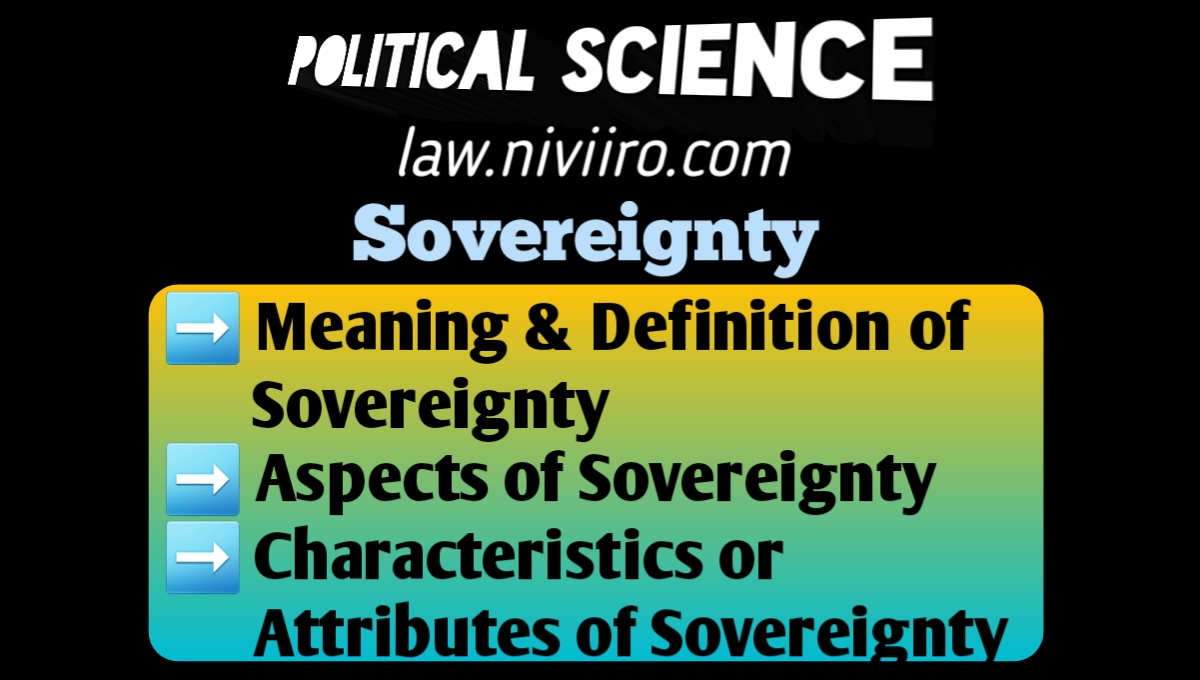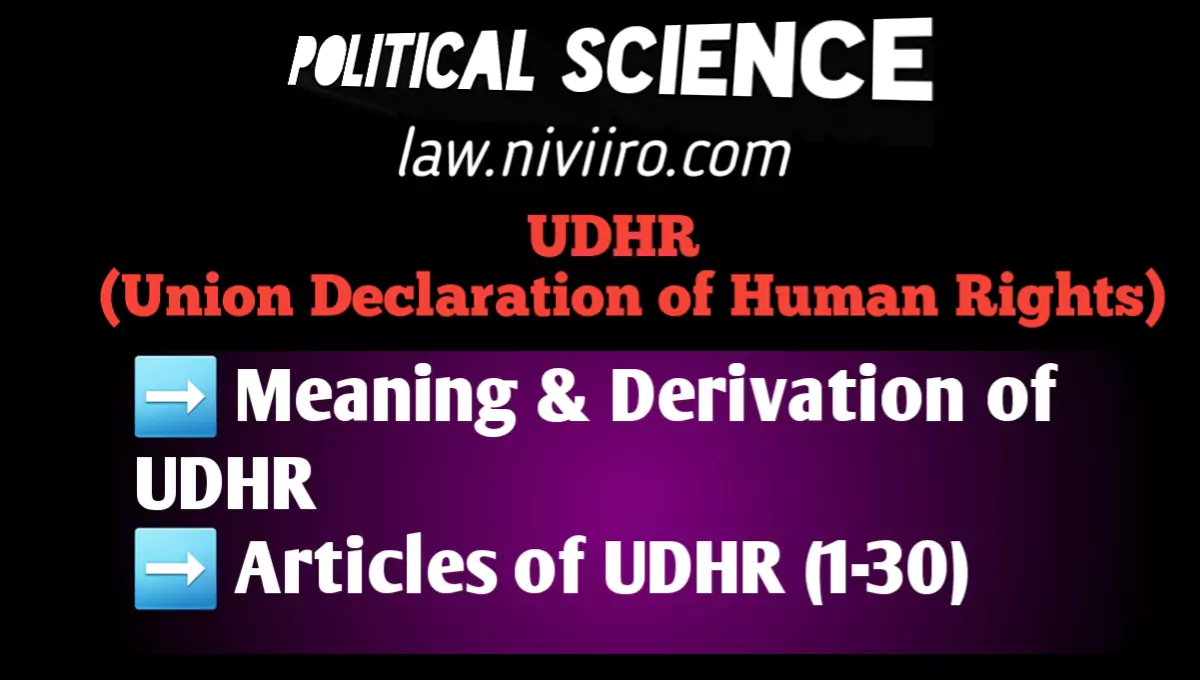The term “Sovereignty” has been derived from the Latin word “Superanus” which means supreme or paramount. Although the name “Sovereignty” is new, the concept dates back to Aristotle, who spoke of the “supreme power of the state.” Throughout the Middle Ages, Roman jurists and laymen maintained this idea in mind, frequently using the terms “Summa” potestas and “Plenitudo potestatis” to indicate the state’s supreme power.
The phrases “Sovereign” and “Sovereignty” were introduced by French jurists in the fifteenth century, and they later made their way into English, Italian, and German political literature. The term “Sovereignty” has been used in political science since the publication of Bodin’s “The Republic” in 1576. “According to J.S. Roucek and others, “the term sovereign entered the language of political theory from the feudal order, where it indicated a relationship between persons.” Any feudal overlord having authority over subjects inside his own dominions was referred to as a sovereign.”
Definitions of Sovereignty
- “That characteristic of the state by virtue of which it cannot be legally bound except by its own or limited by any power other than itself”. (Jellineck)
- “Sovereignty is the sovereign political power vested in him whose acts are not subject to any other and whose will cannot be over-ridden”. (Grotius)
- “Sovereignty is the supreme power of the State over citizens and subjects unrestrained by law”. (Bodin)
- “Sovereignty is that power which is neither temporary nor delegated, nor subject to particular rules which it cannot alter, not answerable to any other power over earth”. (Pollock)
- “Sovereignty is the supreme will of the state”. (Willoughby)
- “Sovereignty is the daily operative power of framing and giving efficacy to the laws” (Woodrow Wilson)
- Sovereignty is “the supreme, irresistible, absolute, uncontrolled authority in which the jurist summi imperi’ reside”. (Blackstone)
Aspects of Sovereignty
There are two aspects of sovereignty: internal sovereignty and external sovereignty.
Internal Sovereignty
Internal Sovereignty means that some individuals or groups of individuals in each independent state have the final legal authority to order and compel allegiance. This sovereignty wields absolute power over all persons or groups of individuals within the state. In this regard, Professor Harold Laski has made an excellent observation: “It issues orders to all men and associations in that area, but it gets no orders from them. Its will is subject to no legal limitation of any kind. What it proposes is right by mere announcement of intention”.
External Sovereignty
External Sovereignty indicates that the state is not subject to any other authority and is not compelled by other states. Every sovereign state retains the right to reject trade accords and enter into military alliances. Each estate is distinct from the others. Every autonomous state is free to pursue its own foreign policy and join whatever power bloc it desires. Any foreign state has no right to intervene in an independent state’s exterior affairs. Thus, by external sovereignty, we mean that each state is autonomous of the other states.
In other words, External Sovereignty refers to national liberty. In this context, Professor Laski has made an excellent observation “A sovereign state is the modern state. As a result, it is independent of other communities. It may infuse its will toward them with a material that is unaffected by any external power’s will “. Professor Laski’s comment makes it very evident that the state has both exterior and internal sovereignty.
Characteristics or Attributes of Sovereignty
According to Dr. Garner, following are the characteristics or attributes of Sovereignty:
(1) Exclusiveness, (2) Permanence, (3) All-Comprehensiveness, (4) Inalienability.
(5) Imprescriptibility, (6) Unity, (7) Indivisibility, (8) Originality,
(9) Absoluteness or illimitability.
Exclusiveness
By exclusivity, we imply that two sovereigns can exist in one independent state, and if two sovereigns exist in a state, the unity of that state is lost. Another sovereign state cannot exist within the existing sovereign state.
Permanence
One of the primary qualities of sovereignty is permanence. Sovereignty exists for the duration of an independent state. The death of the king, the overthrow of the government, and the surrender of power do not result in the annihilation of sovereignty. We must remember that the king or ruler exercises sovereign power on behalf of the state, and hence sovereignty lasts as long as the state does. Death of the king or overthrow of the government has no bearing on sovereignty. This is why the English used to say, “The King is dead, long live the King.”
“Sovereignty does not cease with the death or temporary dispossession of a particular bearer or the reorganisation of the state, but shifts immediately to a new bearer, as the centre of gravity shifts from one part of the physical body to another when it undergoes external change,” writes Dr. Garner.
All-Comprehensiveness
The State is all comprehensive and the sovereign power is universally applicable. Every individual and every group of individuals is subject to state sovereignty. No association or collection of persons, no matter how wealthy or strong, can resist or disobey the sovereign authority. Sovereignty provides no exceptions or grants any exemptions. It only gives exemptions to foreign embassies and diplomatic representatives of other countries on a reciprocal basis. In the legal sense, this has no bearing on the state’s sovereignty. The state has the power to cancel and revoke diplomatic privileges granted to foreigners.
Inalienability
Another feature of sovereignty is inalienability. Sovereignty is inalienable. By inalienability, we mean that the state’s sovereignty cannot be transferred. In other words, if the sovereign or the sovereign state passes his or her sovereignty to another person or another state, the sovereign or the sovereign state ceases to exist. Sovereignty is the state’s life and soul, and it cannot be taken away without destroying the state. “Sovereignty can no more be alienated than a tree can alienate its right to grow or a man can transmit his life or identity to another without self-destruction,” Lieber says.
Imprescriptibility
By imprescriptibility, we imply that if the sovereign does not exercise his sovereignty for a set amount of time, this does not result in the loss of sovereignty. It is only valid for the life of the state.
Unity
Unity is the very spirit of Sovereignty. The sovereign state is united just as we are united.
Indivisibility
Indivisibility is essential to sovereignty. According to American statesman Calhoun, sovereignty cannot be split well “Sovereignty is a whole; to divide it is to destroy it. It is a state’s highest authority, and to divide it is to destroy it. It is a state’s greatest power, and we could just as easily refer to half a square or half a triangle as half a sovereignty “. Gettell has also made an excellent point in this regard. “There is no state if sovereignty is not absolute. When sovereignty is divided, multiple states exist “.
Originality
By originality, we mean that the sovereign exercises power in his own right, not at the mercy of others.
Absoluteness or illimitability
Sovereignty is both absolute and limitless. The sovereign is free to do anything he wants. None can challenge sovereignty.
Related Post
Derivation of the word ‘Sovereignty’ ?
The term “Sovereignty” has been derived from the Latin word “Superanus” which means supreme or paramount. ……
What do you mean by the word Sovereignty ?
the word Sovereignty means “supreme power of the state.”
Define the term ‘Sovereignty’ ?
1. According to Pollock, “Sovereignty is that power which is neither temporary nor delegated, nor subject to particular rules which it cannot alter, not answerable to any other power over earth”.
2. “Sovereignty is the supreme will of the state”. (Willoughby)…………..
What are the two Aspects of Sovereignty ?
There are two aspects of sovereignty: internal sovereignty and external sovereignty.
Meaning of Internal Sovereignty ?
Internal Sovereignty means that some individuals or groups of individuals in each independent state have the final legal authority to order and compel allegiance.
What do you mean by External Sovereignty ?
External Sovereignty indicates that the state is not subject to any other authority and is not compelled by other states.
What are the Characteristics or Attributes of Sovereignty ?
According to Dr. Garner, following are the characteristics or attributes of Sovereignty:
(1) Exclusiveness, (2) Permanence, (3) All-Comprehensiveness, (4) Inalienability.
(5) Imprescriptibility, (6) Unity, (7) Indivisibility, (8) Originality,
(9) Absoluteness or illimitability.
References
- M.P. Jain, Political Theory liberal and Marxiam
- Prof. S.L. Verma, Modern Political Theory
- J.C. Johari, Political Science
- R.C. Agarwal, Political Theory
- Prof. H.C. Verma, Modern Political Theory
- V.D. Mahajan, Political Theory

















